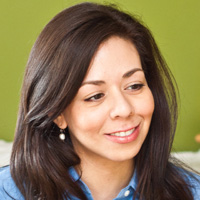Interview with Lila Burgos, Finance & Administration Director

Our Finance & Administration Director, Lila Burgos, is a dynamic planner who specializes in social impact program evaluation, strategic planning and community outreach. She’s currently serving as a Senior Research Analyst at Special Service for Groups. We asked Lila to share her thoughts on her planning career and her love of Los Angeles — here’s what she had to say.
Please provide a brief overview of your current work in planning.
I currently work as a senior researcher and evaluator of place-based community economic development projects. Essentially, I help determine the efficacy and social impact of a variety of different types of planning projects. A lot of my work is cross-sectoral — where planning and public health meet. For example, I’m currently working on a project that is determining how the community is responding to pedestrian and active transit interventions; from usage rates to changes in attitudes on multimodal transit to how activating green spaces has changed perceptions. A part of this project is also observing how different cities and departments (planning, public works, engineering) collaborate across jurisdictions to implement planning interventions — which is important since more often than not, multiple cities within our large California counties must effectively work together. I also do work around social justice and planning, urban demographics, housing and economic trends, and community engagement — it’s fascinating work!
What brought you into planning?
Planning is an inherently intersectional field where architecture, policy, public health, and societal trends meet. I also tell non-planners that city planners are to cities as doctors are to bodies — we work to understand every facet of how the city functions in relation to its other parts and try to diagnose and treat the city’s illnesses without killing it.
Where did you go to school for planning and why?
I am a proud UCLA Bruin, or a MURP as they say. I had been accepted to all the planning programs I was interested in and carefully vetted all of my choices. I chose UCLA because I believe that effective planning cannot take place in a vacuum and that truly equitable cities that implement solutions to inequality through built environment and policy interventions must begin and end with ALL communities being engaged. UCLA’s commitment to this value through their Community Scholars program, the diversity of their staff, the areas of foci for their professors and the applied laboratory that is Los Angeles were major draws.
Why do you love Los Angeles?
Because she’s complicated, fascinating, ever changing. LA keeps me on my toes and I will never figure her out. To me, this is the most exhilarating city in the country. Each neighborhood is this microcosm of civilization — unique people, culture, micro-economies and politics — interwoven together through this sprawled urban form that connects to create the behemoth that is the City of LA and LA County. I enjoy watching people struggle to understand this city and their failed attempts to over-simplify or generalize Los Angeles, because the second they try to put LA in box, I know they’ve lost true understanding entirely. There are micro-economies in neighborhoods — like snacks and goods sold out of entrepreneurial resident homes in Watts or informal, home-based, childcare networks that offer relief for working parents in Pacoima. We have youth that have organized militant, guerrilla-style resistance to gentrification in Boyle Heights and unapologetic and exclusionary wealthy older residents blocking every transportation intervention imaginable in parts of West LA. This city is a beautiful madhouse — how can you not love this place?
What’s something that’s happening in LA that excites you?
I am seeing a lot of planners of color (predominantly Latino and Black but also some API) mobilize to elevate planning issues in communities experiencing inequality and they are changing the narrative of how planning can be done there. Our Los Angeles Section of APA has been hosting a Dialogo series on gentrification and displacement in different parts of South LA. Our next event is called “Investment not Displacement: The Complexities of Planning in Diverse Communities.” It’s civil rights, it’s city planning, it’s everything.
What’s your favorite LA recreation activity?
I’ll let the stereotypes fly here and admit that I am now an avid hiker and that was not the case before I moved here. Being able to get off work and join others hiking through Griffith Park, the Baldwin Hills Scenic Overlook, the LA River or Debs Park is pretty restorative. The weather also makes for ideal cycling year around and there’s nothing like the joy of people watching at CicLAvia.
Tell us about a good book for planners!
To be honest I read fewer books but I read a lot of publications and there are a couple of diverse planning scholars I follow: Marie Kennedy, Lorelene Hoyt Ph.D., Scott D. Campbell Ph.D, Xavier de Souza Briggs Ph.D, Anastasia Loukaitou-Sideris Ph.D, Vinit Mukhija Ph.D, Manuel Pastor Ph.D, and Lois Takahashi Ph.D.





